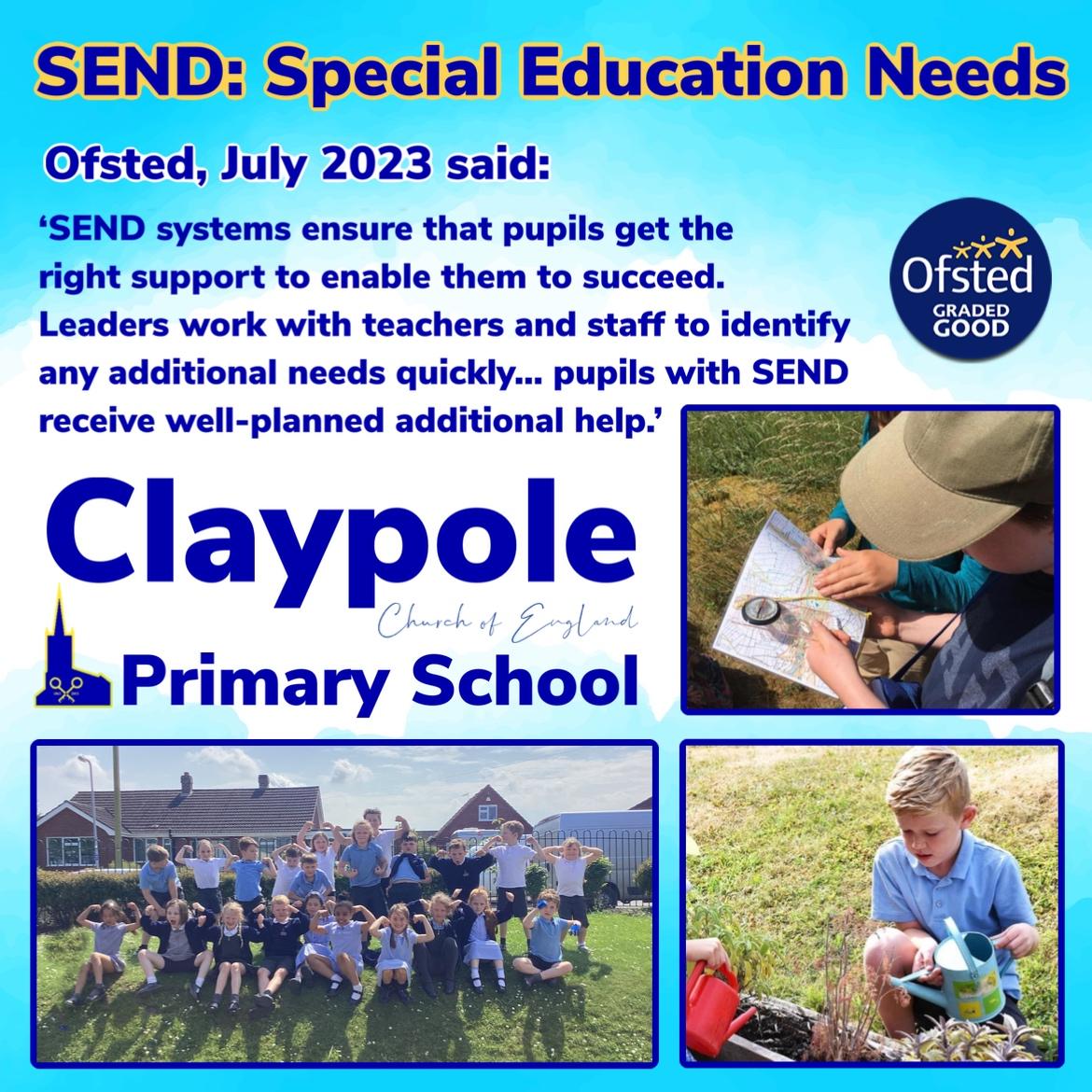SEND

All Schools are required to publish the arrangements they have in place to support pupils with additional needs. This is called our ‘SEND Information Report’. We hope you find the documents below helpful for getting the right support for your child.
This year (2024/25), the school has 163 pupils on roll; currently we have 10% (16 children) on the school’s SEND register and have IEP's (Individual Education Plan) with 1 child in receipt of an EHCP (Educational Health & Care Plan) & one Health Care Plan.
The National average is 14% registered as SEND and 1.5% with EHCP's.
The needs of our children include: medical needs (diabetes), moderate learning, global developmental delay, physical needs, autism, dyslexia, dyspraxia and dyscalculia.
SEND Provision Progression Map
Wave 1: Quality First Teaching → | Wave 2: Additional Interventions → | Wave 3: Specialist Interventions |
Internal referral to move through from Wave 1 to Wave 2 (through professional dialogue with class teacher, teaching assistant & SEND Leader | EHCP application – moving from Wave 2 to Wave 3 | |
Classroom practise:
| Targeted Interventions:
| Individual Approach to Learning:
|
Progress monitored:
| Progress monitored:
| Progress monitored:
|
Potential Additional Requirements:
| Potential Additional Requirements:
| |
Please click on the link to go to the relevant website:
Lincolnshire parent carer forum:
Lincolnshire Parent Partnership offer free confidential advice, information and support to parents and carers about special educational needs
IPSEA stands for Independent Parental Special Education Advice
Young Minds: The voice for young people’s mental health and wellbeing
Young minds Parent Helpline: 08088025544
Support for Parents and Child
- Reading Hints.pdfPDF File
- Education health and care plans explained.pdfPDF File
- SEND support decisions.pdfPDF File
- The local offer for SEND support explained.pdfPDF File
- What are the SEND reforms.pdfPDF File
- ADHD explained.pdfPDF File
- All About Autism.pdfPDF File
- All About OCD.pdfPDF File
- Understanding Tourette Syndrome.pdfPDF File
School funding changes and children with SEN in mainstream schools: a briefing for parents
Does your child have Dyslexia?
Choosing books that will engage and captivate children who struggle with reading is often challenging. Help is now at hand with the publication of a free guide from Barrington Stoke and Dyslexia Action - "Dive in; A guide to choosing children's books for reluctant readers and readers with dyslexia" lists 40 titles divided into age range categories.
Dyspraxia
Autistic Spectrum Condition (ASC)
Makaton
Makaton is a unique communication programme that uses symbols (pictures), signs (gestures) and speech to enable people to communicate. It supports the development of essential communication skills such as attention and listening, comprehension, memory, recall and organisation of language and expression.
Being able to communicate is one of the most important skills we need in life. Almost everything we do involves communication; everyday tasks such as learning at school, asking for food and drink, sorting out problems, making friends and having fun. These all rely on our ability to communicate with each other.
With Makaton, signs are used, with speech, in spoken word order. This helps provide extra clues about what someone is saying. Using signs can help people who have no speech or whose speech is unclear.
If you have any questions about SEND or any concerns, then you could speak to:
Headteacher: Martyn Wells
SEND Leader: Lynn Kurvink
Key Stage 1 Leader: Lynn Kurvink
Key Stage 2 Leader: Elizabeth Silby
SEND Governor: John Garner
We will listen to your concerns and discuss the situation with you. If a longer meeting is needed, this will be arranged. Your concerns will be looked into over an agreed length of time, with the sharing of information between school and home. A follow-up meeting will then be arranged to discuss the next steps.
